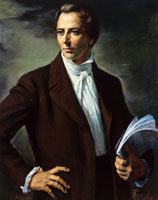At the turn of the 19th Century, newly independent America was growing in self-belief. It had natural resources. It had the beginnings of a national identity. It still had passenger pigeons. It was also home to many profoundly religious people; yet their religion was still one of the Old World, from which the nation had spilt blood to sever itself.
It was, perhaps, inevitable that an American religion should arise, and it did so through Joseph Smith, Jr. More precisely, it arose through a native American angel called Moroni, who helped Smith to unearth the golden Plates of Nephi. The writings upon these plates, as translated by Smith, with the aid of special 'seer stones', would form the basis of the Book of Mormon, intended as the first major addition to Christian scripture since the third century AD.
Where the Old and New Testaments were disappointingly silent about the role of the Americas in God's plan, the Book of Mormon restored balance. It explained that not only had America been populated by refugees from ancient Babylon and Jerusalem, but that it had also experienced a visitation by the resurrected Jesus Christ. More than that, the Americas were a land of special promise, with a particular role to play in God's vision.
In the Protestant tradition, Smith's church regarded all of its followers as saints. It would attract controversy and outright hostility from more traditional Christians, thanks in part to the Mormon predeliction for taking multiple wives. Finding themselves unwelcome wherever they went, the Mormons eventually embarked on the gruelling journey to settle in deserted Utah.














